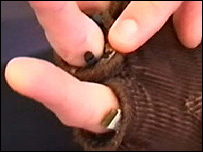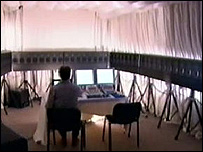http://news.bbc.co.uk/1/hi/programmes/click_online/4764911.stm
New feel and sound of computers
 By David Reid
By David Reid
Reporter, BBC Click

 The Sensitive PC glove will measure temperature and sweat levels
The Sensitive PC glove will measure temperature and sweat levels
Let's face it, computers can be torture. Even when you have thrown away the box and got everything up and running, they can leave anyone pulling their hair out.
Manufacturers are working hard to make them more user-friendly, or simply friendly.
Already there are hard drives that look like Lego, and TVs at home in the toy box.
Consumer electronics and technology are leaping the age and gender gap.
But huggable hi-tech may not be where the future really lies. Stirring emotions is one thing; reading them is something very different.
The sensitive PC is a research project intended to improve interaction between man and machine, and to see if computers can be made to respond to what their users feel.
Dr Jörg Voskamp, from Germany's Fraunhofer Institute, which runs the project, says: "People can see my emotions, and more or less see that I have feelings, but the computer can't, so we think there's a lack in the communication.
"We thought that it might be a good idea to bring the computer up to speed in this way."
The system consists of sensors in a glove. They measure your temperature, skin conductivity (if you are in a sweat), while a belt takes your pulse.
Users play a game and how they react to the game is tracked and interpreted by the computer.
Dr Voskamp says: "We will try to manipulate the user to send him into different emotional directions.
Lego-style hard drives are just one way of simplifying computers
"During these tests the window pops up where he is asked: "Give us your current feelings. Have you been surprised? Are you happy? Are you angered?' or something like that."
Possible applications are in e-learning, gaming and, more seriously, for monitoring people like air-traffic controllers.
They are the sort of people who are expected to handle stress and so might not own up when they are in over their heads.
A sensitive computer could alert workers that one of their colleagues is under extreme stress and prevent any life-threatening human error before it takes place.
New sounds
The Fraunhofer Institute also invented MP3, the audio compression technology that allows people to transfer audio files online.
All ears then for the Fraunhofer's next big audio thing: Iosono.
 Iosono involves 192 pairs of speakers to create 3D sound
Iosono involves 192 pairs of speakers to create 3D sound
"It's a new technology for real immersive sound, really 3D sound", says Karlheinz Brandenburg.
"It is like going from mono to stereo - a whole new world of sound using a ring of loud-speakers around a room.
"It is already used in virtual reality environments. We will see it at the cinema at some point in time and eventually in the home.
"At the moment it is still very expensive, but the potential there is to revolutionise all audio reproduction."
The science behind Iosono is wave field synthesis. Rather than a handful of speakers pumping out a pre-mix of sounds to make a rough approximation of what you hear, Iosono uses 192 pairs.
Each speaker responds independently to signals from a computer. The system transports the listener to the 3D sounds and acoustics of another sound environment. It seems computers are now well poised to delve even deeper into our visual, auditory and emotional landscapes.
New feel and sound of computers

Reporter, BBC Click


Let's face it, computers can be torture. Even when you have thrown away the box and got everything up and running, they can leave anyone pulling their hair out.
Manufacturers are working hard to make them more user-friendly, or simply friendly.
Already there are hard drives that look like Lego, and TVs at home in the toy box.
Consumer electronics and technology are leaping the age and gender gap.
But huggable hi-tech may not be where the future really lies. Stirring emotions is one thing; reading them is something very different.
The sensitive PC is a research project intended to improve interaction between man and machine, and to see if computers can be made to respond to what their users feel.
Dr Jörg Voskamp, from Germany's Fraunhofer Institute, which runs the project, says: "People can see my emotions, and more or less see that I have feelings, but the computer can't, so we think there's a lack in the communication.
"We thought that it might be a good idea to bring the computer up to speed in this way."
The system consists of sensors in a glove. They measure your temperature, skin conductivity (if you are in a sweat), while a belt takes your pulse.
Users play a game and how they react to the game is tracked and interpreted by the computer.
Dr Voskamp says: "We will try to manipulate the user to send him into different emotional directions.
Lego-style hard drives are just one way of simplifying computers
"During these tests the window pops up where he is asked: "Give us your current feelings. Have you been surprised? Are you happy? Are you angered?' or something like that."
Possible applications are in e-learning, gaming and, more seriously, for monitoring people like air-traffic controllers.
They are the sort of people who are expected to handle stress and so might not own up when they are in over their heads.
A sensitive computer could alert workers that one of their colleagues is under extreme stress and prevent any life-threatening human error before it takes place.
New sounds
The Fraunhofer Institute also invented MP3, the audio compression technology that allows people to transfer audio files online.
All ears then for the Fraunhofer's next big audio thing: Iosono.

"It's a new technology for real immersive sound, really 3D sound", says Karlheinz Brandenburg.
"It is like going from mono to stereo - a whole new world of sound using a ring of loud-speakers around a room.
"It is already used in virtual reality environments. We will see it at the cinema at some point in time and eventually in the home.
"At the moment it is still very expensive, but the potential there is to revolutionise all audio reproduction."
The science behind Iosono is wave field synthesis. Rather than a handful of speakers pumping out a pre-mix of sounds to make a rough approximation of what you hear, Iosono uses 192 pairs.
Each speaker responds independently to signals from a computer. The system transports the listener to the 3D sounds and acoustics of another sound environment. It seems computers are now well poised to delve even deeper into our visual, auditory and emotional landscapes.
